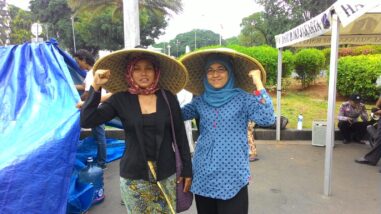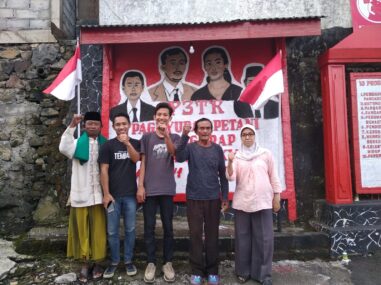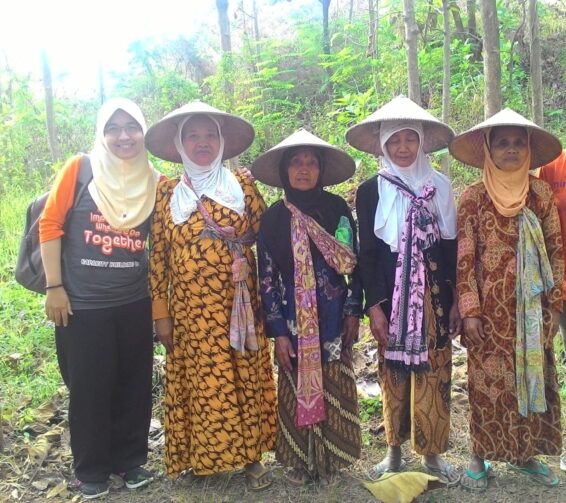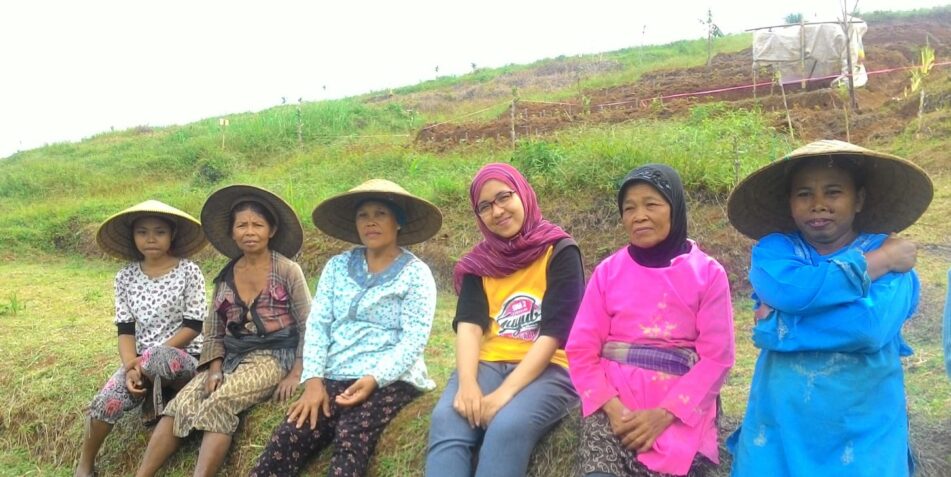Stories
Network Member Interview: Siti Rakhma Mary Herwati, Yayasan Lembaga Bantuan Hukum Indonesia (YLBHI)
In this interview, Rakhma Mary shares her journey and what inspires her, along with the important work YLBHI does in the field of land and environmental justice.
What experience or individual inspired you to join the fight for land and environmental justice?
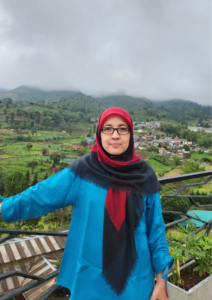
Rakhma Mary has been working with communities for almost 17 years.
Shortly after I graduated from the faculty of law, I was able to join the Semarang Legal Aid Institute.
During this time, I was in the land division, which fit with my interests. I started to learn about the land conflicts in Central Java, and how to facilitate and provide critical legal education and empowerment to the farmers. That was the first time I became a volunteer, and that was also the first time I learned about agrarian conflicts in Central Java itself. In most of the cases I handled, the majority of the farmers were criminalized. That was difficult to face: we were the facilitators and organizers for the community, but at the same time, when we knew that the farmers had been criminalized, we had to switch our position from the community organizer to litigator.
At least 10 cases of criminalization appeared in the year 2000, and more than 30 farmers had been jailed. It was then I realized that if our farmers don’t have land, or the lands are grabbed by companies or by the government, they will not have something to live for. It’s not as easy as what the government thinks, where farmers sell their land, and then the developers build infrastructure projects and offer compensation. In Indonesia, especially in Java, land is closely related to religious, economic, and socio-cultural aspects.
I almost never stayed in the office too – I was just back to the office writing reports from the field. So mostly, almost every day I went to a village, and I moved to other villages to facilitate discussions and deliberate on the next actions with the community.
“Because I have been involved for quite a long time in this work, I can see the difference in how the system and policies change through legal empowerment and action research.”
I didn’t realize it at the time, but what we were doing was Participatory Action Research. All of our work making reports and taking action based on what the community wanted to do – that was Participatory Action Research and legal empowerment combined.
Was there a turning point or particular moment in your life that shaped you or had a lasting impact on your journey?
There are two particular moments: one was a case about land redistribution in Semarang District, and the second case about a cement company.
The land redistribution case was one that we won against a company. The land owned originally by the farmers was grabbed and abandoned by this company.
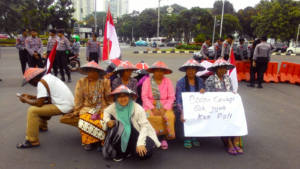
Women protesting in the city.
The farmer community – about 6,000 farmers – rallied and demonstrated in various locations, including the national land agency, the prosecutor’s office, and the police office. Because of this, some of the community leaders were criminalized. The demonstrations continued even with the ongoing charges, until, because of their organizing, all of the community leaders were released from jail. They also finally got the land redistribution titles after the national land agency revoked the company’s permits. That’s when I learned a lot about community organizing and people power, and how it can actually do so much.
The second turning point was when I was involved in filing a case against a cement company. This company wanted to operate in karst area with natural caves and underground rivers, namely Kendeng Mountains. Even without our office intervening, their community really understood the impact of cement mining – for women, specifically, they realized that they will lose their water source for daily and agricultural consumption and put the next generation in danger. They realized that they need to fight for environmental protection.
The government continued the development of the cement factory. As a form of protest, the community members cemented their feet – both women and men. There were nine women during the first demonstration, and then around 65 people joined at the second demonstration. After that, some of the activists also cemented their feet, including me. I only joined for about 2 or 3 hours in front of the German Embassy in Jakarta, but the others cemented their feet for a week.
One of the women who participated in the demonstration died on the second day of protest in the YLBHI office. That experience struck me most, and I realized that this meant everything: for the environment, for the people, and for their land.
If we cannot assist them, if we cannot support them, we have to feel very ashamed. If the cement mining was in my community, I questioned myself: could I go through the same struggles, like the women who cemented their feet for days? I realize that the situation may be different, but we have to support them, as far as we can.
This work can be challenging and difficult. What inspires you and helps you keep going?
I think this links back to ourselves. Are we just involved in this ‘activity’? Is it just for fun? Or do we really want to make the situation better? If there is still injustice, and the government is getting worse, or their policies are not getting better, we would need to be there. If I don’t have the same motivation, or the same vision with YLBHI, maybe it will be difficult.
The next generation needs to be educated and be equipped with knowledge. When I joined YLBHI, I had to be idealistic and ideological about structural legal aid and about human rights.
“Wherever we are, we are ‘alumni’ of legal aid and of human rights. We need to keep our values, not only when we have activities.”
Right now, I am in YLBHI, but maybe one day I won’t be in this field anymore. The challenge for me and for all of us is: who will be the next alumni of legal aid, and can they uphold the values of legal aid even when they are outside of this field? This will depend on ourselves and on the people around us.
Above: Photos from Rakhma’s meetings with communities.

